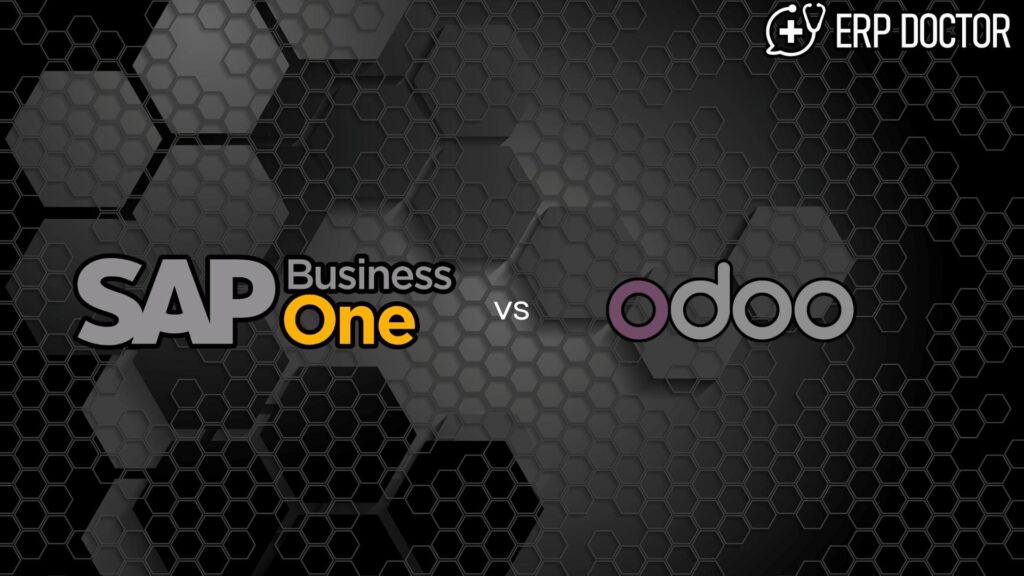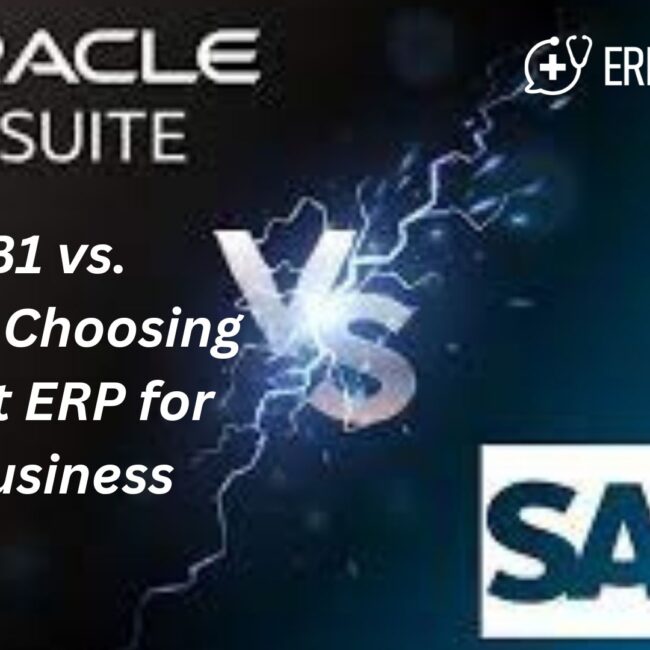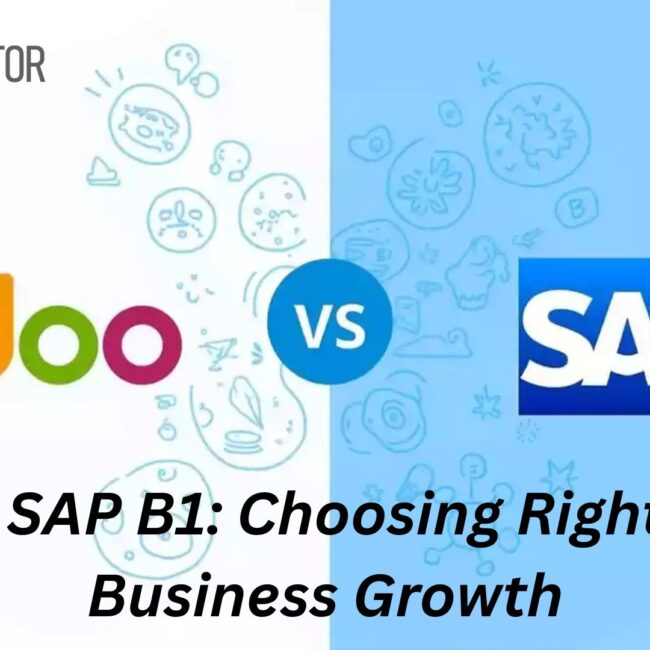
SAP B1 vs Odoo: Choosing the Right ERP for Healthcare Industry

Finding the Ideal ERP Match: SAP B1 vs Odoo for Healthcare
The healthcare industry is under constant pressure to improve patient care, streamline operations, and maintain compliance with stringent regulations. Choosing the right ERP system is crucial to managing these challenges effectively. Among the top contenders, SAP B1 (SAP Business One) and Odoo stand out as robust ERP platforms tailored to meet industry-specific needs.
In this blog, we offer an in-depth comparison between SAP Business One and Odoo, highlighting their strengths, key features, and how they support the evolving demands of the healthcare industry. Whether you’re a hospital, clinic, or diagnostic center, this guide will help you choose the most suitable ERP system.
Understanding ERP in the Healthcare Industry
Before diving into the comparison, it’s important to understand why ERP is essential in the healthcare industry. ERP (Enterprise Resource Planning) software helps healthcare providers manage:
- Patient records and appointments
- Inventory and medical supplies
- Billing and finance
- Regulatory compliance
- Inter-department communication
A well-implemented ERP like SAP B1 or Odoo can unify these processes into a single system, improving operational efficiency and data accuracy across the board.
SAP B1 (SAP Business One) Overview
SAP Business One is a comprehensive, integrated ERP solution designed for small to mid-sized enterprises. Known for its stability and scalability, SAP B1 has gained popularity in the healthcare industry for its ability to handle complex workflows and strict compliance requirements.
Key Features of SAP B1 for Healthcare:
- Integrated Inventory Management: Track medical supplies in real-time, automate reordering, and reduce wastage.
- Financial Management: Handle billing, reimbursements, insurance claims, and financial reporting seamlessly.
- Compliance and Audit Readiness: Built-in features support HIPAA, HL7, and other healthcare regulations.
- Customizable Dashboards: Real-time visibility into patient data, KPIs, and operational metrics.
- Mobile Access: Support for field medical staff and remote monitoring.
SAP B1 Advantages:
- Robust reporting and analytics tools
- Strong data security and role-based access
- Seamless integration with other SAP products and third-party tools
- Proven track record in regulated industries like healthcare
SAP B1 empowers healthcare providers to achieve greater accuracy, efficiency, and compliance—all crucial to patient-centered care.
Odoo Overview
Odoo is an open-source, modular ERP platform that offers flexibility and cost-effectiveness. With a wide range of apps that can be customized and extended, Odoo is appealing to healthcare organizations looking for tailored solutions.
Key Features of Odoo for Healthcare:
- Patient and Appointment Management: Custom modules for managing patient data, appointments, and communication.
- Inventory and Procurement: Streamlined control over medical supplies and vendor interactions.
- Billing and Invoicing: Easy integration of payment gateways and insurance claim handling.
- Custom Workflows: Build specific process flows for departments like radiology, labs, or surgery.
- Community Support and Third-party Integrations: Active developer community and a rich app store.
Odoo Advantages:
- Highly customizable with open-source flexibility
- Modular structure allows for phased implementation
- Lower upfront costs compared to traditional ERP systems
- Wide variety of third-party healthcare modules
Odoo is especially suitable for smaller clinics or healthcare startups looking to grow without heavy licensing constraints.
SAP Business One vs Odoo: Side-by-Side Comparison
| Feature | SAP B1 (SAP Business One) | Odoo |
|---|---|---|
| Industry Focus | Regulated industries, including healthcare | Broad industry support, customizable for healthcare |
| Customization | Moderate with SAP consultants | High due to open-source framework |
| Compliance Support | Strong (HIPAA, HL7) | Moderate, requires custom development |
| Integration Capabilities | SAP ecosystem and certified third-party apps | Extensive via APIs and community modules |
| User Interface | Enterprise-grade, data-rich | User-friendly and modern |
| Support and Training | Extensive, SAP-certified partners | Community and third-party support |
| Scalability | High for growing healthcare networks | Flexible for scaling, depending on setup |
Which ERP Is Best for Your Healthcare Organization?
Choosing between SAP B1 and Odoo depends on your specific needs:
- Go with SAP B1 if your healthcare organization requires high regulatory compliance, advanced analytics, and robust data security. It’s ideal for hospitals, labs, and multi-specialty clinics.
- Choose Odoo if you need flexibility, quick customizations, and a modular approach to digital transformation. It’s great for smaller clinics or niche healthcare startups.
In either case, both SAP Business One and Odoo provide the core functionalities essential for the healthcare industry, including patient management, supply chain control, and financial transparency.
Final Thoughts
The healthcare industry requires ERP systems that are secure, adaptable, and future-ready. Both SAP B1 and Odoo bring powerful tools to the table, but their suitability depends on your operational goals, IT capabilities, and compliance requirements.
Whether you choose SAP Business One for its structured, enterprise-grade performance or Odoo for its agile, modular design, your investment in the right ERP system will ultimately enhance patient outcomes and streamline your healthcare operations.
FAQs
1. Can SAP B1 handle medical inventory and pharmacy management?
Yes, SAP B1 offers real-time inventory control and integrates seamlessly with pharmacy systems for better stock visibility.
2. Is Odoo suitable for multi-location healthcare chains?
With proper customization, Odoo can support multi-location operations, although SAP B1 offers stronger out-of-the-box support for this.
3. How do SAP Business One and Odoo support healthcare compliance?
SAP B1 has built-in compliance tools, while Odoo may require custom modules to meet specific regulatory needs.
4. Which ERP is better for healthcare analytics?
SAP B1 provides more advanced built-in analytics. Odoo supports analytics but may require integration with third-party tools.
5. Can both systems be integrated with EHR platforms?
Yes, both SAP B1 and Odoo support integration with electronic health record systems through APIs or connectors.
6. Is Odoo’s open-source nature a risk for healthcare?
While flexibility is a plus, healthcare organizations must ensure strong security and compliance oversight when customizing Odoo.
7. How do both ERPs support telemedicine?
Both platforms can be extended for telemedicine with third-party apps or custom modules.
8. Which ERP has better mobile access for healthcare staff?
SAP B1 offers strong mobile solutions. Odoo also supports mobile access but may need configuration.
9. Can these ERPs manage insurance claims?
Yes, both support insurance workflows, with SAP B1 offering deeper native features and Odoo allowing flexible configuration.
10. Do SAP B1 and Odoo support patient engagement features?
Yes, both can manage patient communications, feedback, and appointment reminders using integrated tools or custom modules.







